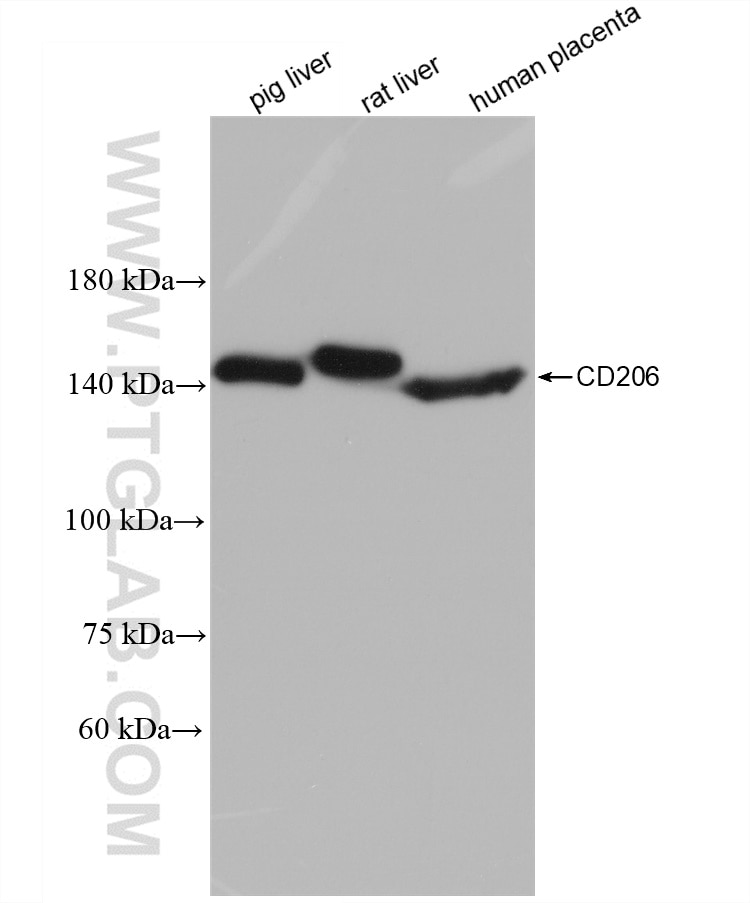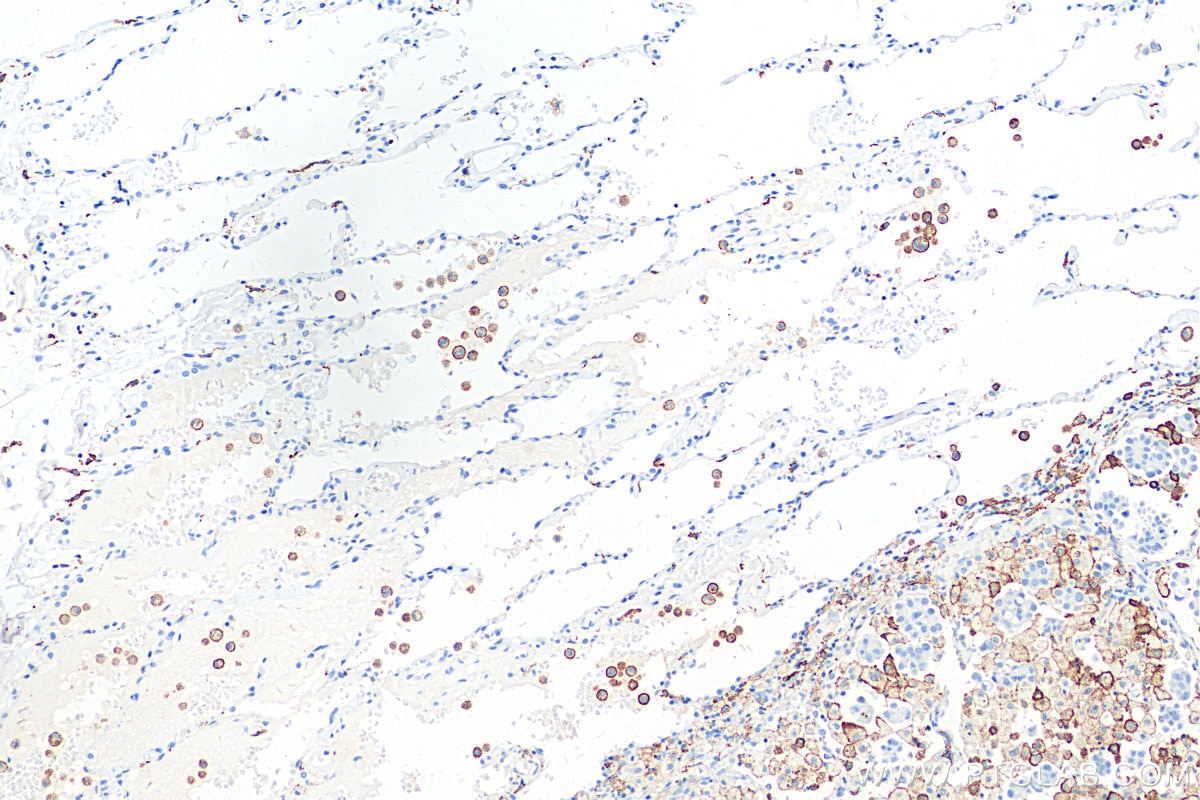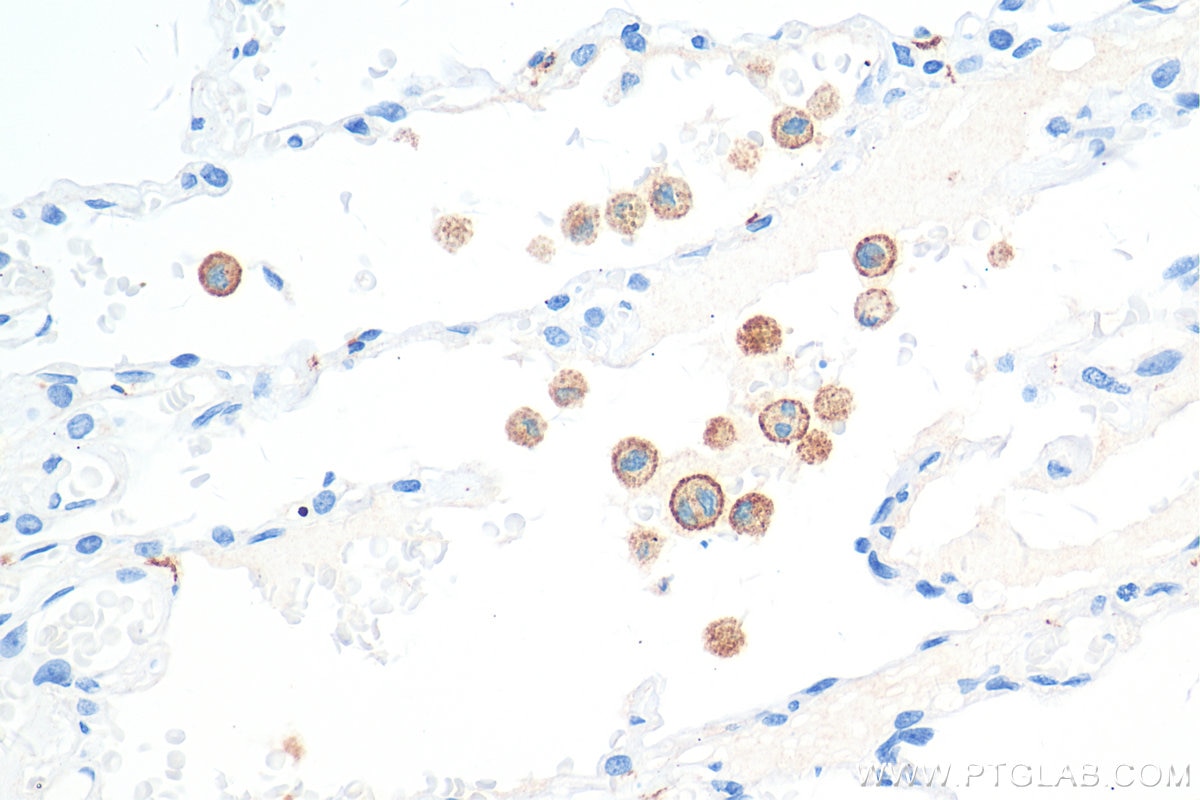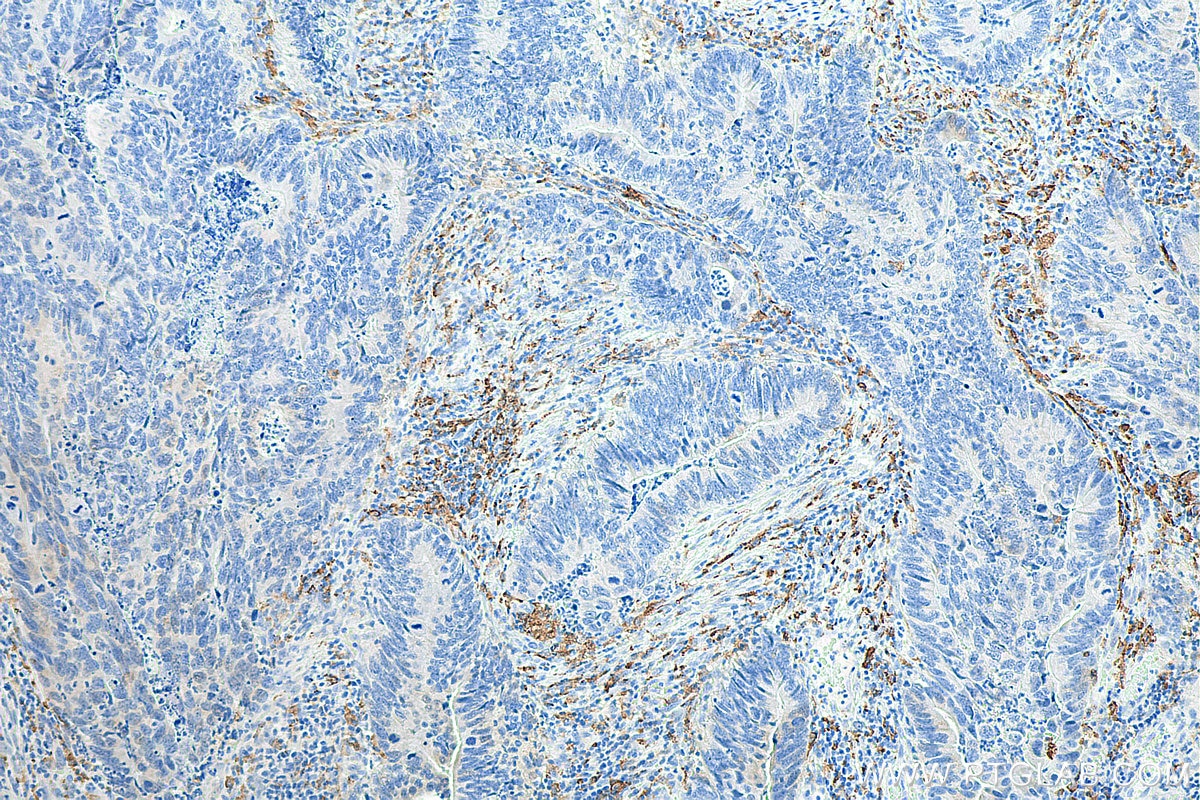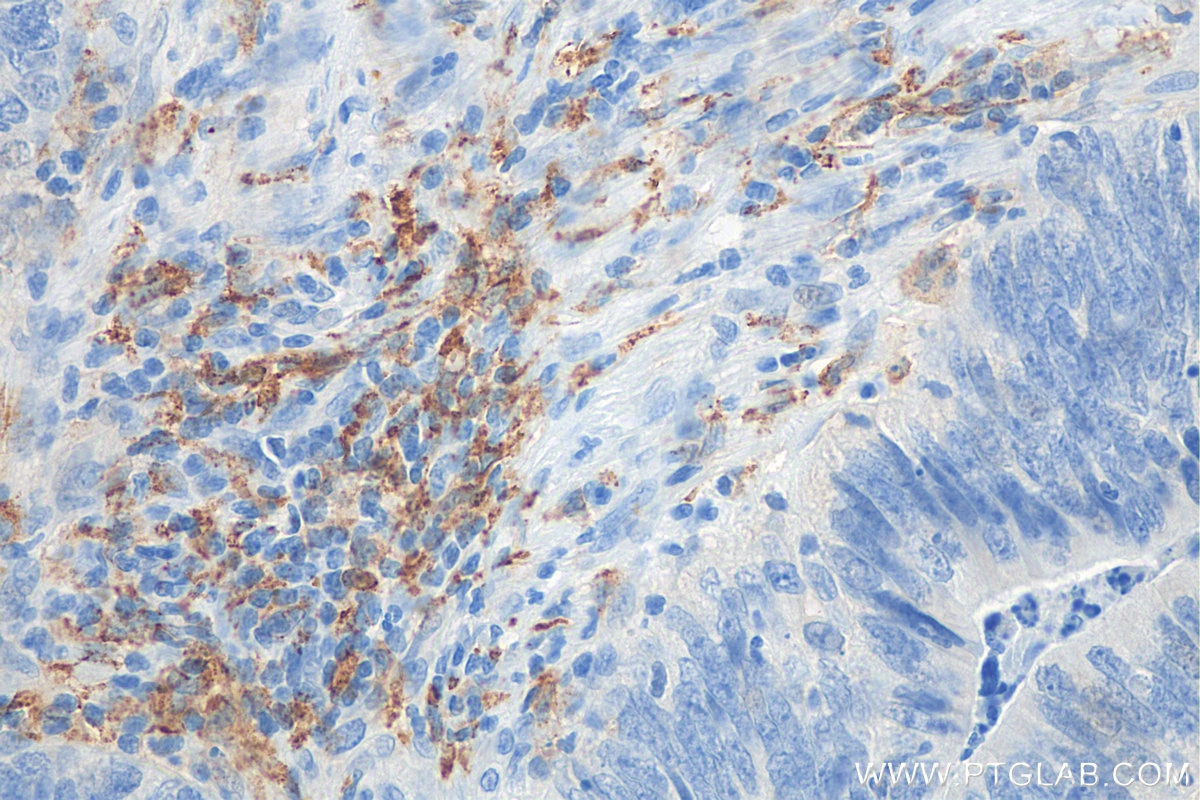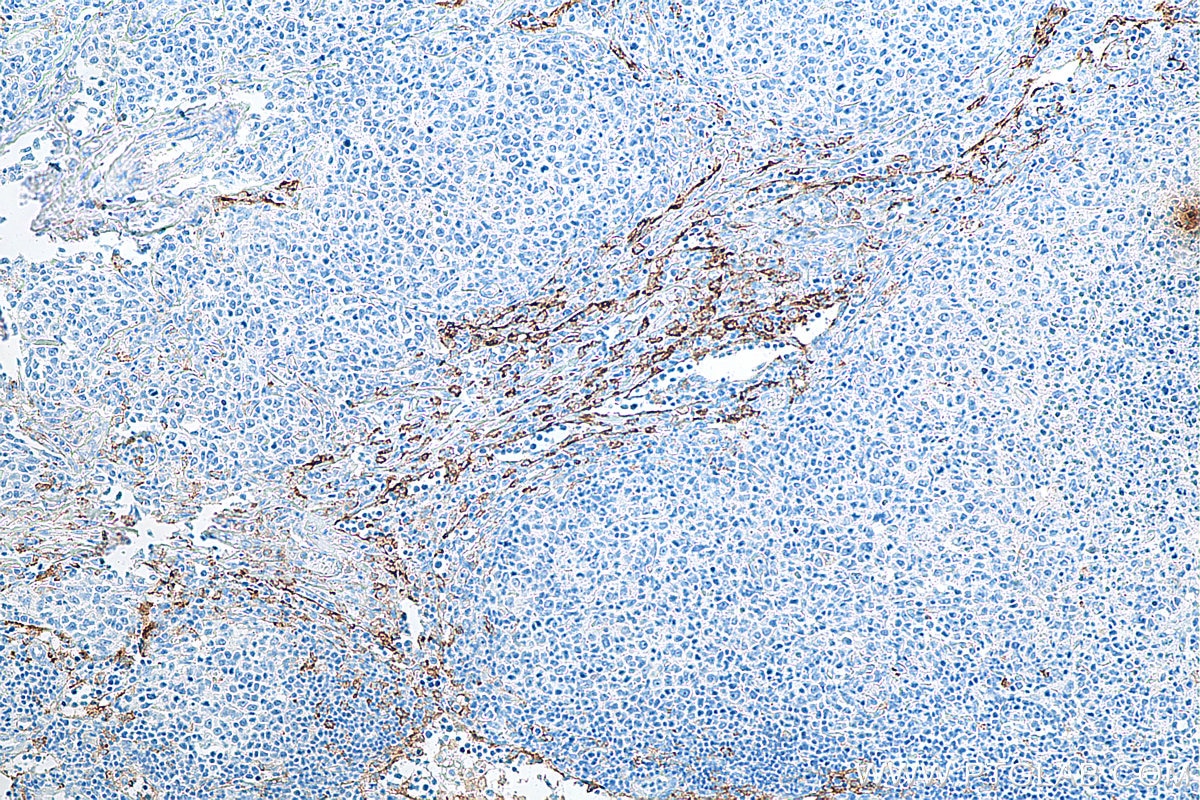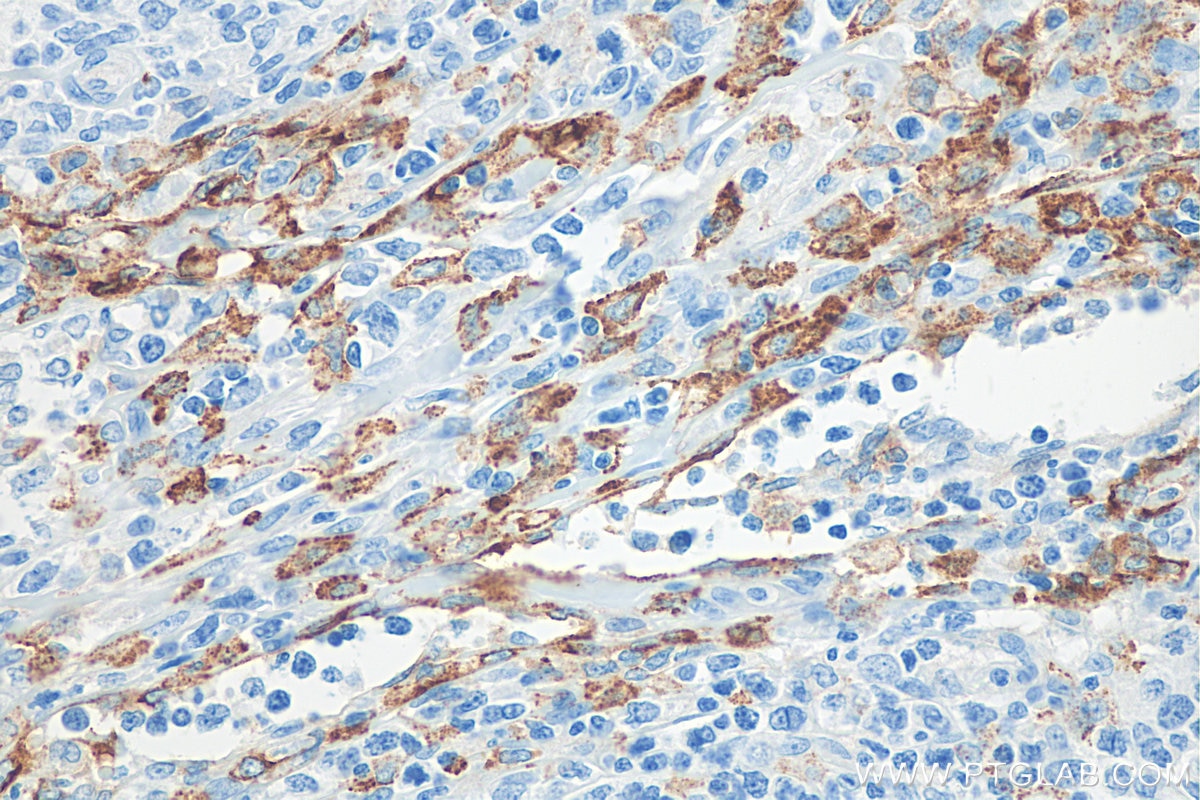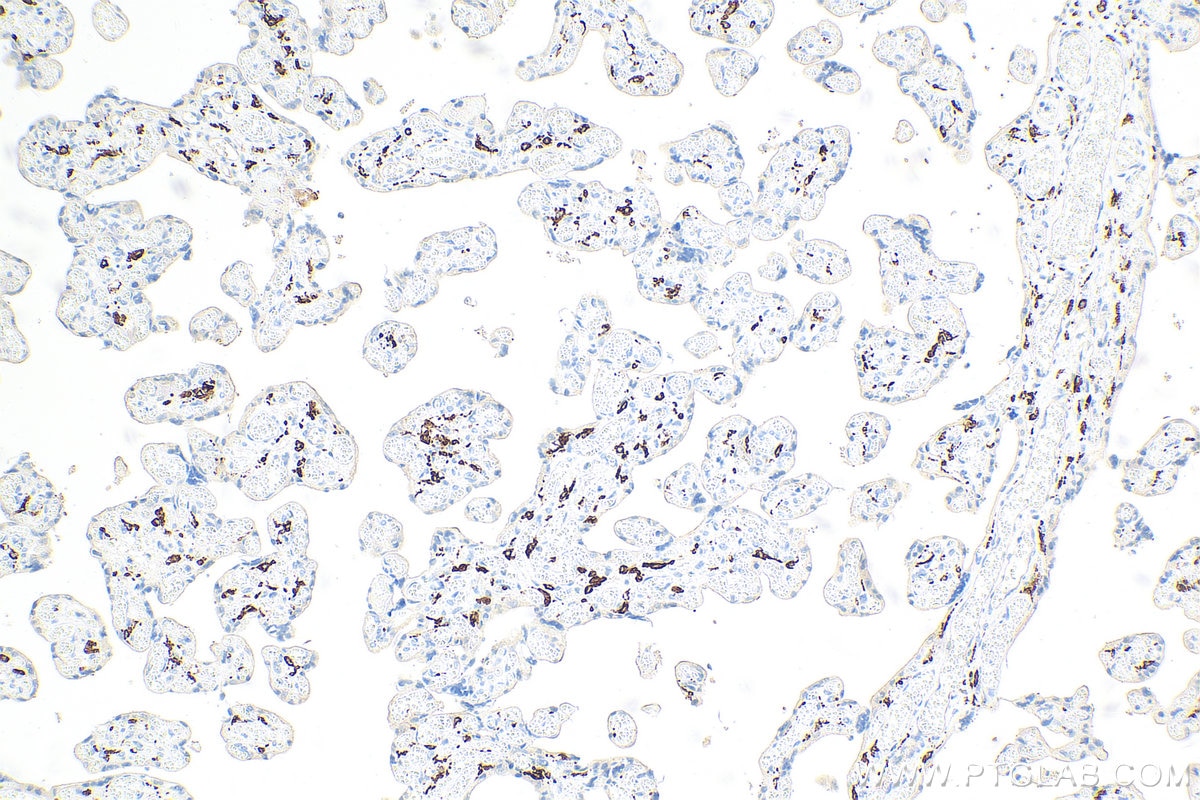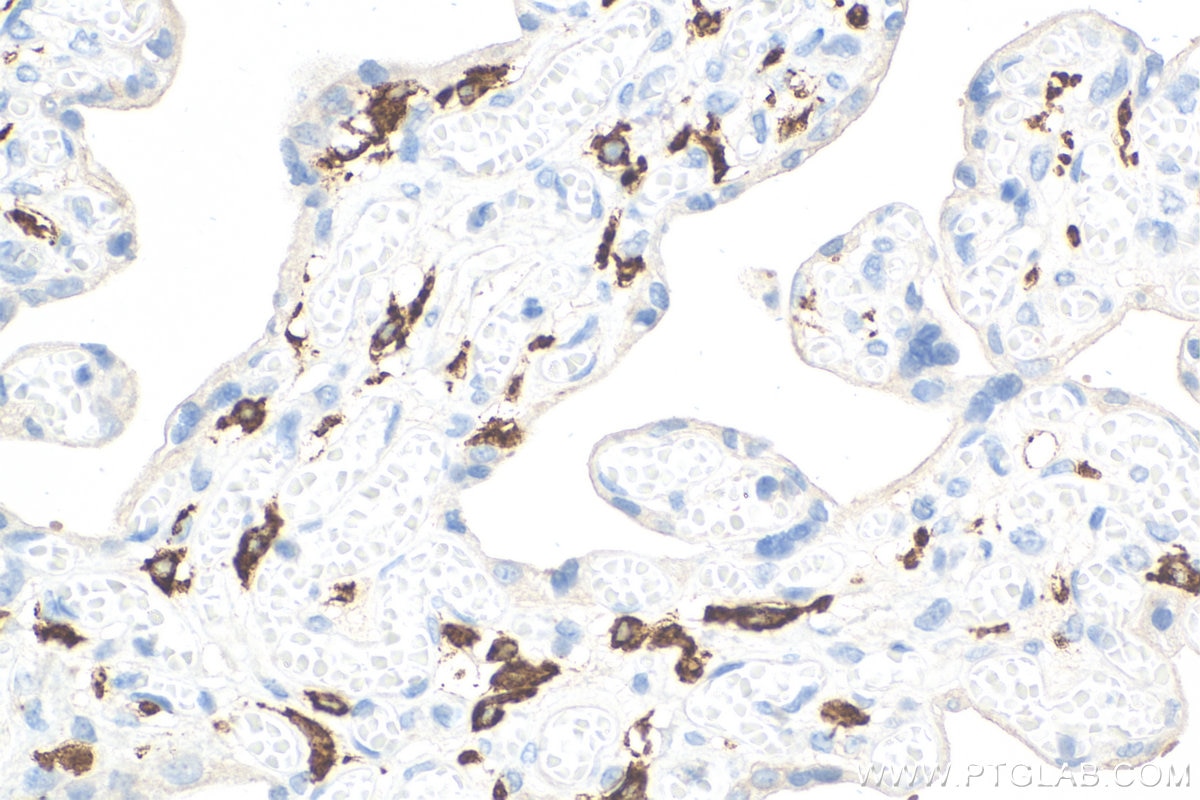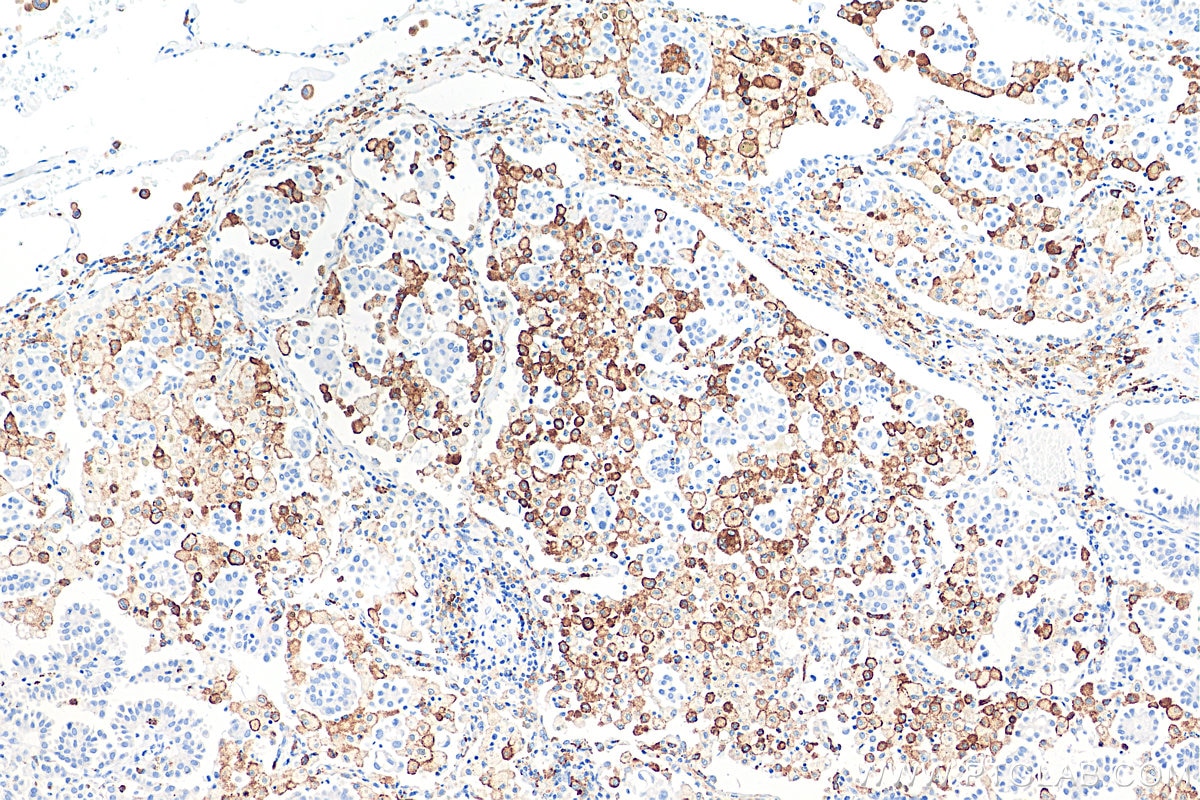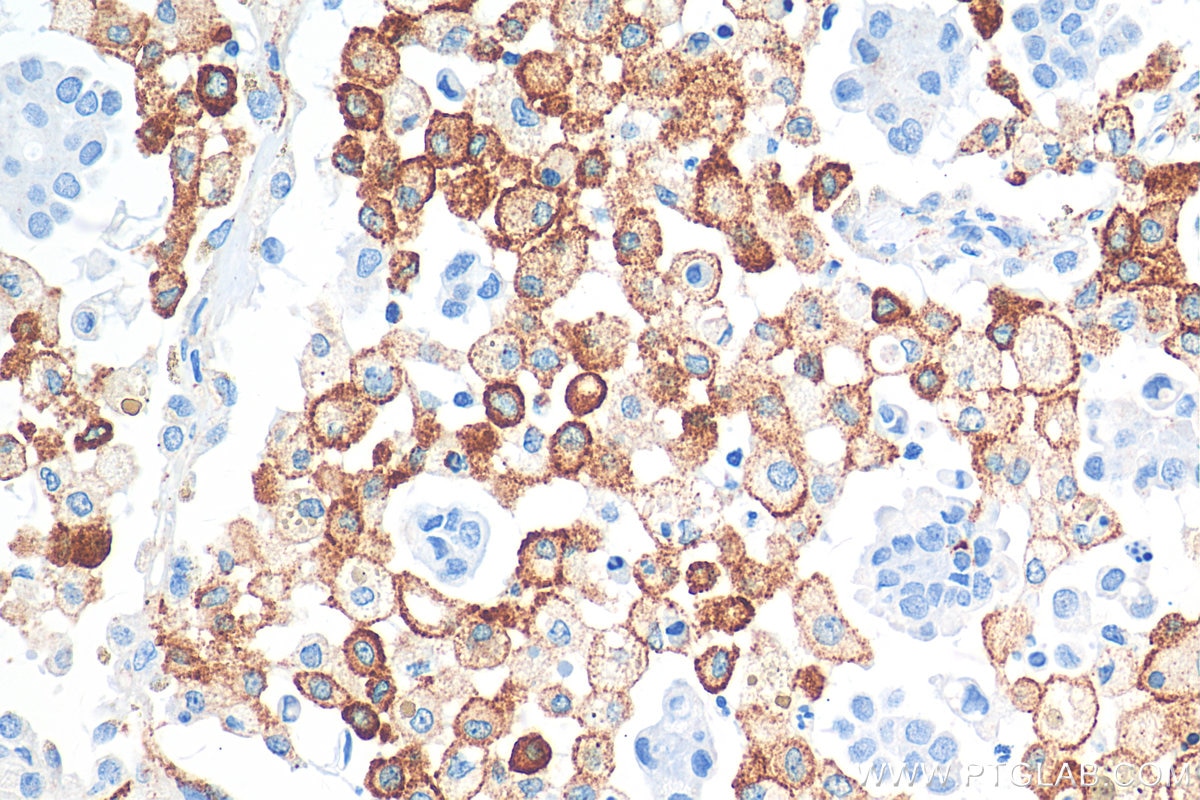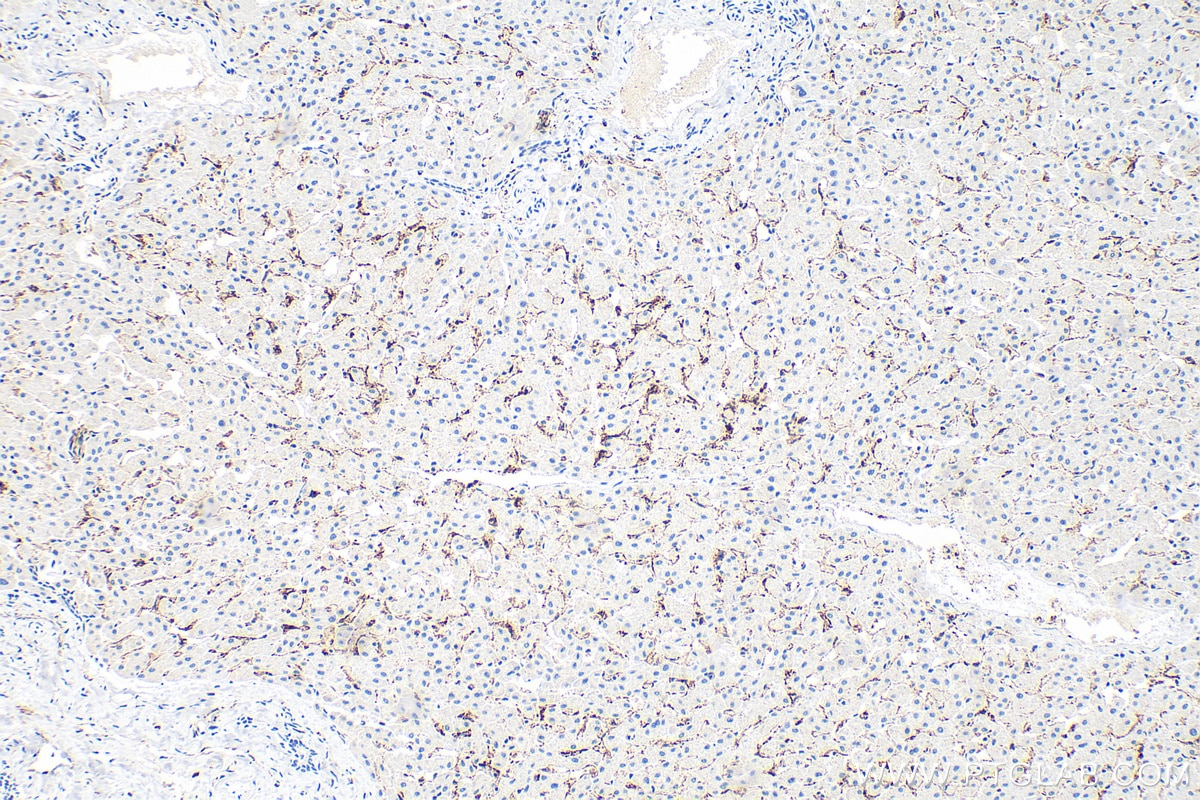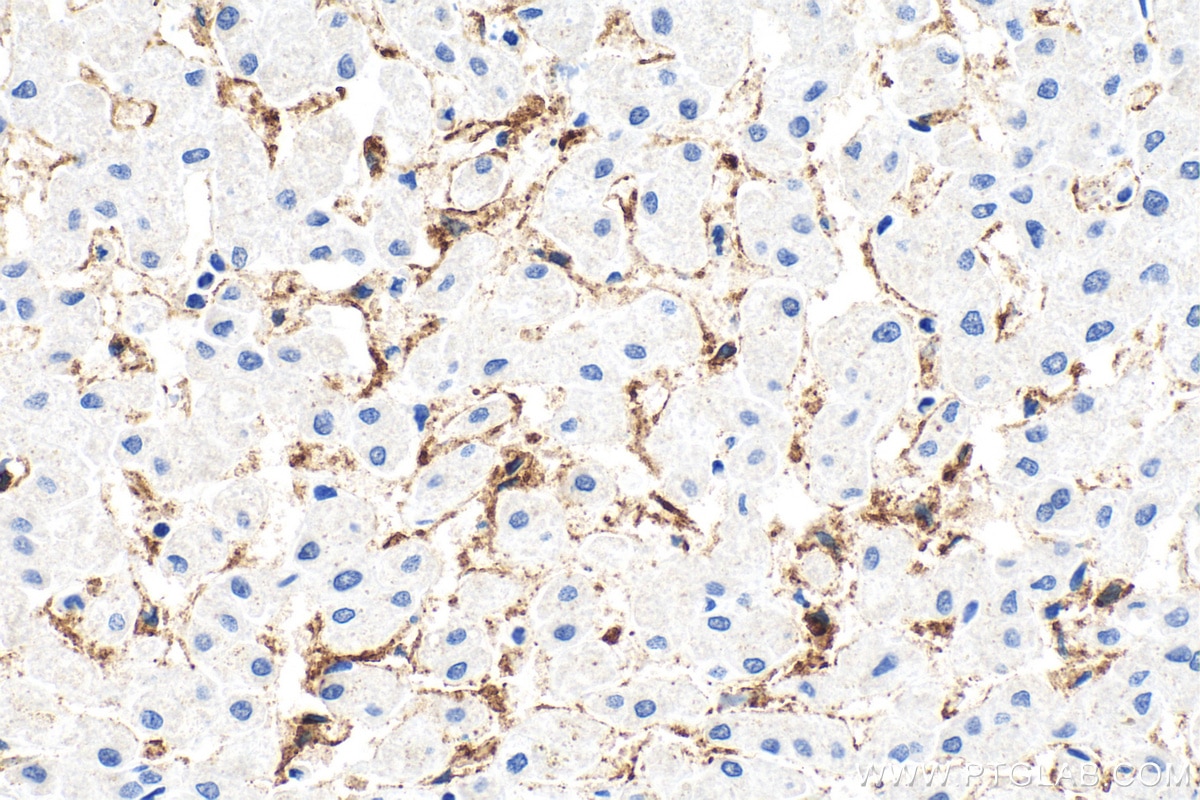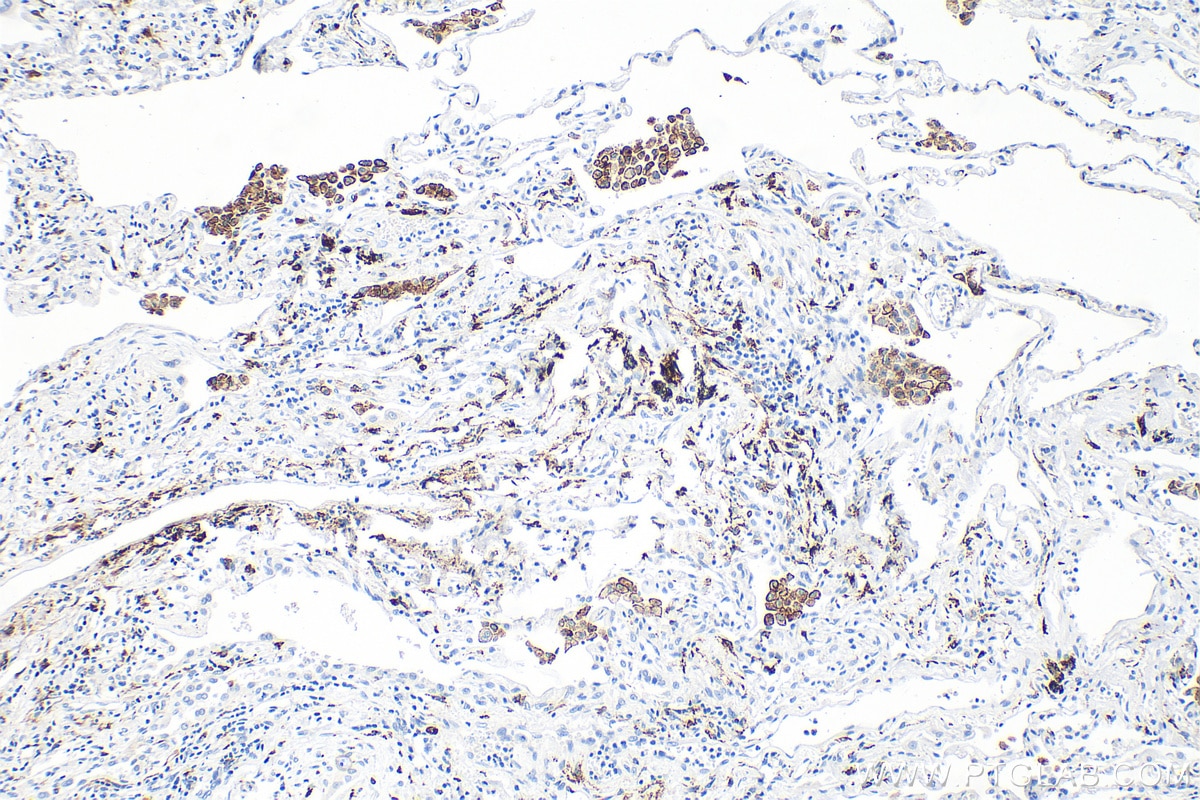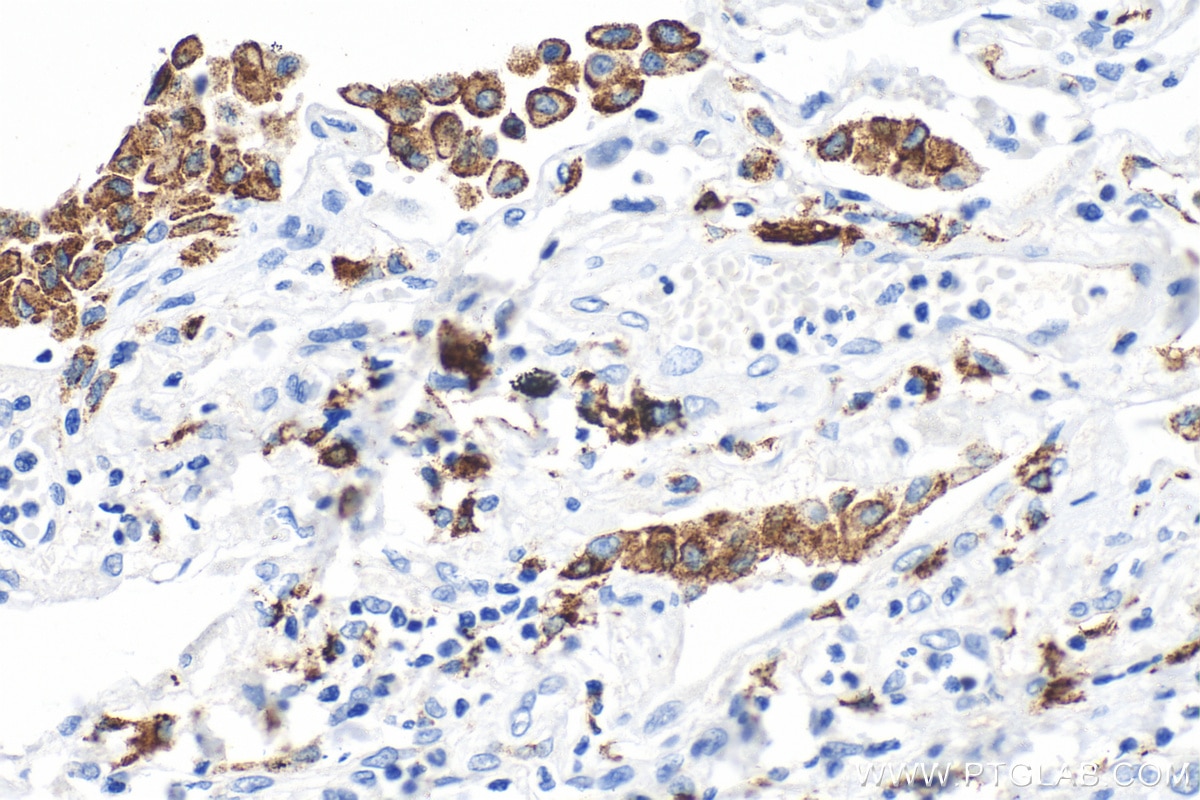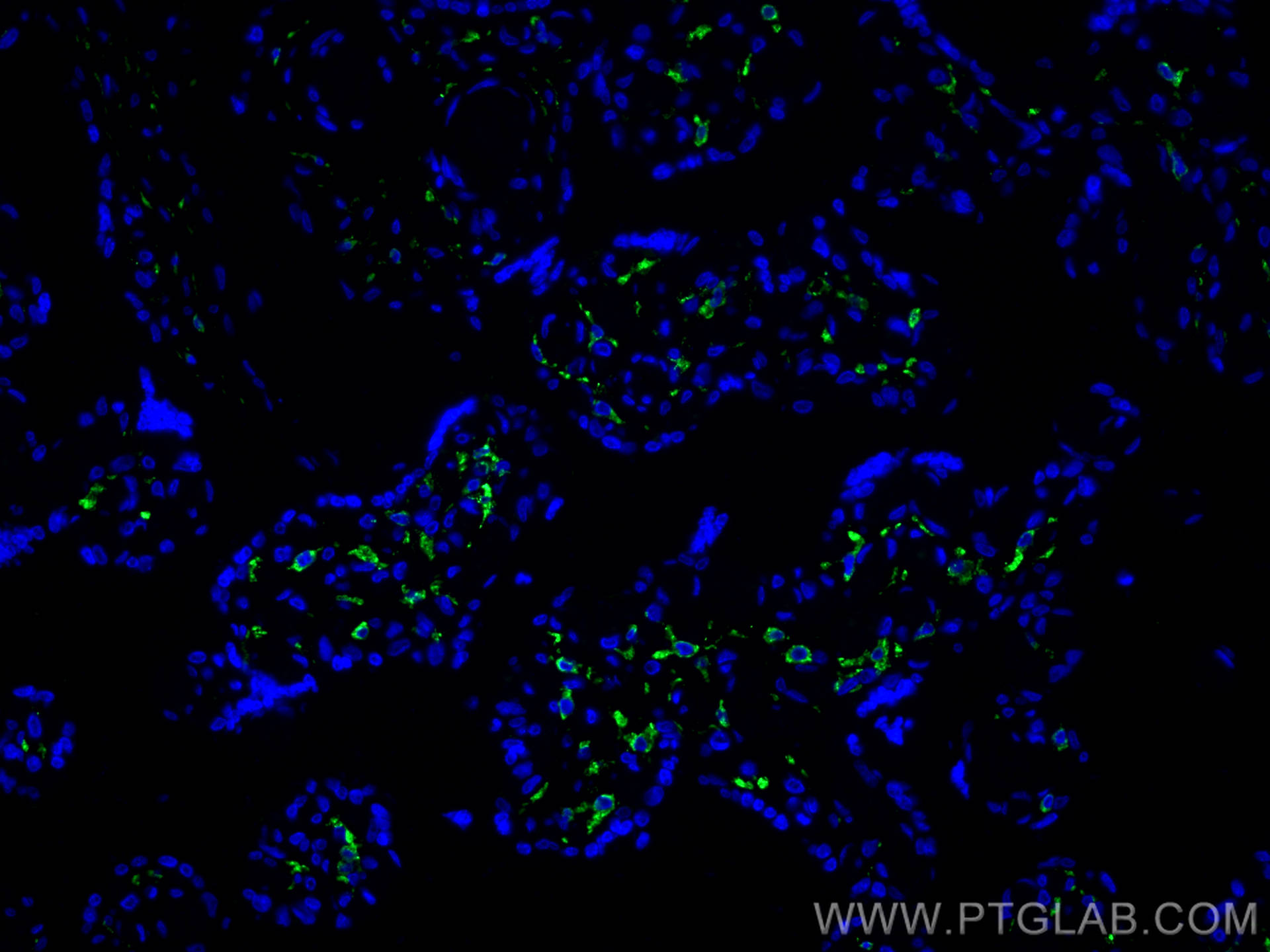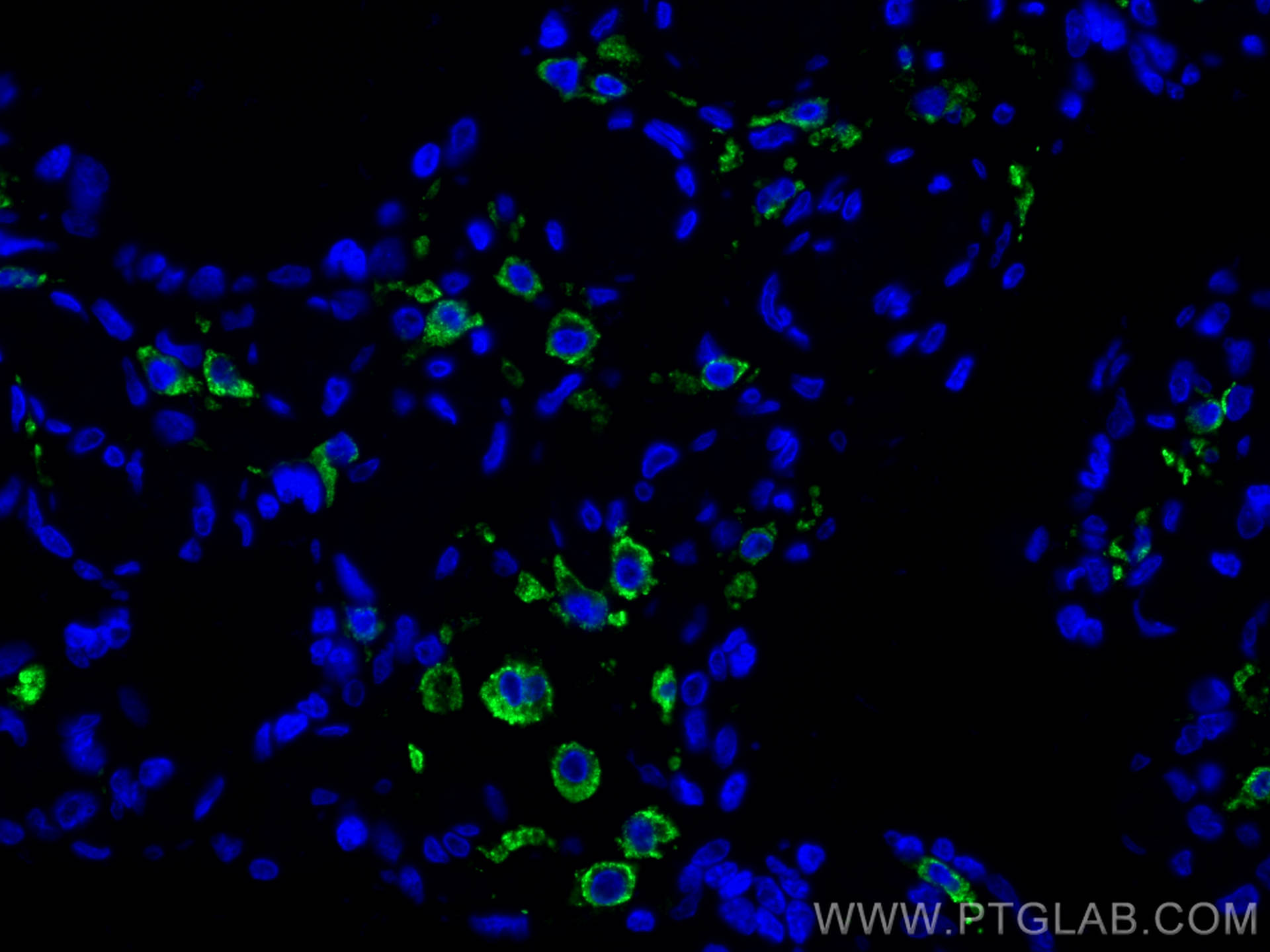IHC Figures
IHC staining of human lung cancer using 81525-1-RR (same clone as 81525-1-PBS)
Immunohistochemical analysis of paraffin-embedded human lung cancer tissue slide using 81525-1-RR (CD206 antibody) at dilution of 1:2000 (under 10x lens). Heat mediated antigen retrieval with Tris-EDTA buffer (pH 9.0). This data was developed using the same antibody clone with 81525-1-PBS in a different storage buffer formulation.
IHC staining of human lung cancer using 81525-1-RR (same clone as 81525-1-PBS)
Immunohistochemical analysis of paraffin-embedded human lung cancer tissue slide using 81525-1-RR (CD206 antibody) at dilution of 1:2000 (under 40x lens). Heat mediated antigen retrieval with Tris-EDTA buffer (pH 9.0). This data was developed using the same antibody clone with 81525-1-PBS in a different storage buffer formulation.
IHC staining of human colon cancer using 81525-1-RR (same clone as 81525-1-PBS)
Immunohistochemical analysis of paraffin-embedded human colon cancer tissue slide using 81525-1-RR (CD206 antibody) at dilution of 1:2000 (under 10x lens). Heat mediated antigen retrieval with Tris-EDTA buffer (pH 9.0). This data was developed using the same antibody clone with 81525-1-PBS in a different storage buffer formulation.
IHC staining of human colon cancer using 81525-1-RR (same clone as 81525-1-PBS)
Immunohistochemical analysis of paraffin-embedded human colon cancer tissue slide using 81525-1-RR (CD206 antibody) at dilution of 1:2000 (under 40x lens). Heat mediated antigen retrieval with Tris-EDTA buffer (pH 9.0). This data was developed using the same antibody clone with 81525-1-PBS in a different storage buffer formulation.
IHC staining of human lymphoma using 81525-1-RR (same clone as 81525-1-PBS)
Immunohistochemical analysis of paraffin-embedded human lymphoma tissue slide using 81525-1-RR (CD206 antibody) at dilution of 1:2000 (under 10x lens). Heat mediated antigen retrieval with Tris-EDTA buffer (pH 9.0). This data was developed using the same antibody clone with 81525-1-PBS in a different storage buffer formulation.
IHC staining of human lymphoma using 81525-1-RR (same clone as 81525-1-PBS)
Immunohistochemical analysis of paraffin-embedded human lymphoma tissue slide using 81525-1-RR (CD206 antibody) at dilution of 1:2000 (under 40x lens). Heat mediated antigen retrieval with Tris-EDTA buffer (pH 9.0). This data was developed using the same antibody clone with 81525-1-PBS in a different storage buffer formulation.
IHC staining of human placenta using 81525-1-RR (same clone as 81525-1-PBS)
Immunohistochemical analysis of paraffin-embedded human placenta tissue slide using 81525-1-RR (CD206 antibody) at dilution of 1:2000 (under 10x lens). Heat mediated antigen retrieval with Tris-EDTA buffer (pH 9.0). This data was developed using the same antibody clone with 81525-1-PBS in a different storage buffer formulation.
IHC staining of human placenta using 81525-1-RR (same clone as 81525-1-PBS)
Immunohistochemical analysis of paraffin-embedded human placenta tissue slide using 81525-1-RR (CD206 antibody) at dilution of 1:2000 (under 40x lens). Heat mediated antigen retrieval with Tris-EDTA buffer (pH 9.0). This data was developed using the same antibody clone with 81525-1-PBS in a different storage buffer formulation.
IHC staining of human lung cancer using 81525-1-RR (same clone as 81525-1-PBS)
Immunohistochemical analysis of paraffin-embedded human lung cancer tissue slide using 81525-1-RR (CD206 antibody) at dilution of 1:2000 (under 10x lens). Heat mediated antigen retrieval with Tris-EDTA buffer (pH 9.0). This data was developed using the same antibody clone with 81525-1-PBS in a different storage buffer formulation.
IHC staining of human lung cancer using 81525-1-RR (same clone as 81525-1-PBS)
Immunohistochemical analysis of paraffin-embedded human lung cancer tissue slide using 81525-1-RR (CD206 antibody) at dilution of 1:2000 (under 40x lens). Heat mediated antigen retrieval with Tris-EDTA buffer (pH 9.0). This data was developed using the same antibody clone with 81525-1-PBS in a different storage buffer formulation.
IHC staining of human liver using 81525-1-RR (same clone as 81525-1-PBS)
Immunohistochemical analysis of paraffin-embedded human liver tissue slide using 81525-1-RR (CD206 antibody) at dilution of 1:2000 (under 10x lens). Heat mediated antigen retrieval with Tris-EDTA buffer (pH 9.0). This data was developed using the same antibody clone with 81525-1-PBS in a different storage buffer formulation.
IHC staining of human liver using 81525-1-RR (same clone as 81525-1-PBS)
Immunohistochemical analysis of paraffin-embedded human liver tissue slide using 81525-1-RR (CD206 antibody) at dilution of 1:2000 (under 40x lens). Heat mediated antigen retrieval with Tris-EDTA buffer (pH 9.0). This data was developed using the same antibody clone with 81525-1-PBS in a different storage buffer formulation.
IHC staining of human lung using 81525-1-RR (same clone as 81525-1-PBS)
Immunohistochemical analysis of paraffin-embedded human lung tissue slide using 81525-1-RR (CD206 antibody) at dilution of 1:4000 (under 10x lens). Heat mediated antigen retrieval with Tris-EDTA buffer (pH 9.0). This data was developed using the same antibody clone with 81525-1-PBS in a different storage buffer formulation.
IHC staining of human lung using 81525-1-RR (same clone as 81525-1-PBS)
Immunohistochemical analysis of paraffin-embedded human lung tissue slide using 81525-1-RR (CD206 antibody) at dilution of 1:4000 (under 40x lens). Heat mediated antigen retrieval with Tris-EDTA buffer (pH 9.0). This data was developed using the same antibody clone with 81525-1-PBS in a different storage buffer formulation.
IF-P Figures
IF Staining of human placenta using 81525-1-RR (same clone as 81525-1-PBS)
Immunofluorescent analysis of (4% PFA) fixed paraffin-embedded human placenta tissue using CD206 antibody (81525-1-RR, Clone: 1G15 ) at dilution of 1:200 and CoraLite®488-Conjugated AffiniPure Goat Anti-Rabbit IgG(H+L) (SA00013-2). Heat mediated antigen retrieval with Tris-EDTA buffer (pH 9.0). This data was developed using the same antibody clone with 81525-1-PBS in a different storage buffer formulation.
IF Staining of human placenta using 81525-1-RR (same clone as 81525-1-PBS)
Immunofluorescent analysis of (4% PFA) fixed paraffin-embedded human placenta tissue using CD206 antibody (81525-1-RR, Clone: 1G15 ) at dilution of 1:200 and CoraLite®488-Conjugated AffiniPure Goat Anti-Rabbit IgG(H+L) (SA00013-2). Heat mediated antigen retrieval with Tris-EDTA buffer (pH 9.0). This data was developed using the same antibody clone with 81525-1-PBS in a different storage buffer formulation.
